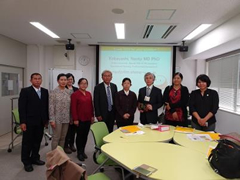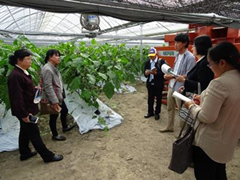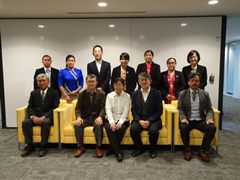Project News
October 31, 2017
Project News in October 2017
1. Dispatch YAU counterparts to Group Training in three universities in Shikoku, Japan
Following the first dispatch of YAU staff to Japanese universities implemented last year, the second dispatch was conducted from 20th to 31st October with the International Cooperation Center for Agricultural Education (ICCAE), Nagoya University, as a course supervisor. Six members from YAU counterparts participated in the course. The purpose of this training is to make them learn the education and research management system of Japanese universities and to make use of their experiences for the improvement of YAU's education and research systems. As the program intended to make them learn the current condition of university's contribution to regional and community development, three universities in the Shikoku Region, Ehime University, Kagawa University and Kochi University were visited, in which Faculties of Agriculture have special programs for cooperating with and contributing to regional communities in the region. In this connection, in addition to these universities, the team visited Kochi Prefectural Agricultural Technology Research Center and Aki Agricultural Promotion Center in order to learn the actual processes of disseminating and applying the research results for the development of agriculture in the regions.
Although two typhoons approached and landed when they were in Japan, the course could be successfully implemented all programs as scheduled.
We hope that the outcomes of the training course will be utilized to improve future YAU education and research system.
 At Ehime University (23rd October)
At Ehime University (23rd October)
 At JA Tosa-Aki (27th October)
At JA Tosa-Aki (27th October)
 National Innovation Center, Nagoya Univ. (29th October)
National Innovation Center, Nagoya Univ. (29th October)
2. Short-term Training in Kyoto University
Two academic staffs of YAU (Mr. Arkar Minn, Department of Agricultural Engineering and Ms. Ei Ei Win Maung, Department of Animal Science) were dispatched to the Graduate School of Agriculture of Kyoto University on 21st of October to participate in the short-term training program in Japan for Capacity Building for Academic Staff in Departments of Agricultural Engineering and Animal Science, Yezin Agricultural University (YAU). They will take training courses individually at the Experimental Farm and the Department of Applied Biological Science in the Graduate School until November 23.
3. Implementation of Pilot Research
Status Report Seminar of Research Groups, which was the midterm gathering for sharing the achievement of each research group in the program, was organized and held by Research TF on 11th October. 21 pilot research groups out of 27 presented their reports on the achievement and prospects of their research activities, budget implementation in this fiscal year, and the plan of budget use for the next fiscal year.
1) Research groups under the Pilot Research Program conducted fieldworks as follows.
- 1st, 8th, 15th and 22nd October:
RB03-1 group collected insects in 7 Townships in Nay Pyi Taw. - 2nd to 5th October:
CR-01 group conducted interview survey to small-scale dairy farmers and observed methods of livestock feeding, pasture production and dairy products. - 18th October:
RB01-1-2 group conducted survey on the growth and farming practices of wet rice grown in Pyinmana TS, Nay Pyi Taw. - 18th to 21st October:
RB01-2 group conducted interview survey to farmers on soil and water management in Pyinmana TS, Nay Pyi Taw. - 25th to 27th October:
RC01-2 group conducted survey on sesame supply chain in Yangon. - 27th October:
RB01-1-3 group collected information on farming practices for growing vegetables in Pyinmana TS, Nay Pyi Taw. - 28th to 29th October:
RB02-1 group collected soil sample for the study on nematode in Pyinmana, Tatkone and Yamaethin TS, Nay Pyi Taw. - 29th to 30th October:
RB01-1-1 group conducted preparatory study on the cultivation of pulses and made a flight plan for the field observation using drone in Thonegawa TS, Yangon. - 30th to 31st October
CR-04 group conducted survey on the growth of deep water rice cultivated with peculiar local method (stem-cutting transplanting method) in Thanapin TS, Yangon.
2) Laboratory and in-farm experiments were also conducted as follows
- RA01-1-1(Plant Breeding, Physiology and Ecology group)
The group carried out experiments to measure the changes in grain length before and after cooking and to analyze amylose contents of rice grains about hundred varieties and strains. - RA01-1-2(Agronomy group)
The team continues to investigate yielding abilities and other indicators of the varieties (85% completed). - RA01-2 (Soil and Water Science group)
The team continues to grow rice varieties and strains which were provided by RA01-1 group to screen the salt-tolerant ones. - RA02-1(Plant Pathology group)
Pathogens of rice blast and leaf blight collected in Zaya Thiri and Pyinmana were continuously cultured. And the team cultivates 94 varieties and strains of rice harvested by RA01-1 group to investigate disease tolerance. - RA02-2 (Entomology and Zoology group)
The team cultivated 93 rice varieties and strains harvested by RA01-1 group both in paddy field and pots to investigate tolerance against yellow stem borer. However, this experiment faces difficulty of continuation due to unexpected floods in the experimental farm caused by heavy rain and long-lasting discharge of the reservoir. - RA03-1 (Agricultural Economics group)
The team is writing the paper based on the research results. - RB03-1(Entomology and Zoology group)
Toward making a pest-warning model, the team continues activities to identify and count pests collected by insect net and the insect traps newly established in the NPT Special Council. - RC-01-1 (Agronomy group)
The team analyses collected data and prepares the paper. - RC-02-2 (Plant Pathology group)
The group continues to cultivate pathogens isolated from the infected mango fruits. - CR-03 (Agricultural Economics group)
Completing the report writing on the research conducted in Mandalay and Magwe, the team submitted the draft paper to an academic journal. - CR-04 (Plant Breeding, Physiology and Ecology group)
Report writing is still ongoing. The group also continues the surveys on the growth of deep-water rice grown both in the DAR experimental pond and the fields in the deep-water area in Thanatpin TS, Bago.
- About JICA
- News & Features
- Countries & Regions
- Our Work
- Thematic Issues
- Types of Assistance
- Partnerships with Other Development Partners
- Climate Change / Environmental and Social Considerations
- Evaluations
- Compliance and Anti-corruption
- Science and Technology Cooperation on Global Issues
- Research
- JICA Development Studies Program / JICA Chair
- Support for the Acceptance of Foreign HRs / Multicultural and Inclusive Community
- Publications
- Investor Relations
